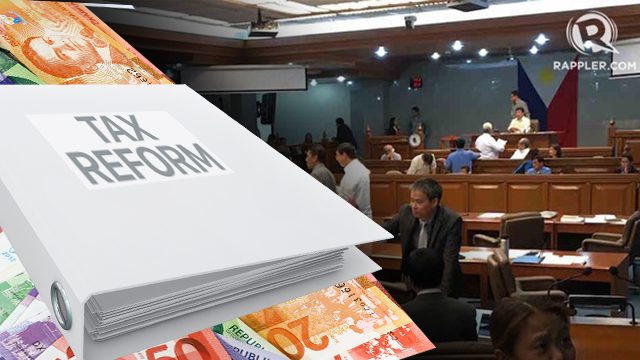SUMMARY
This is AI generated summarization, which may have errors. For context, always refer to the full article.

MANILA, Philippines – Following the House of Representatives’ lead, the Senate has now passed its version of the tax reform bill which estimates that around 64% of workers will be exempt from paying income tax.
The senate ways and means committee filed its version of the bill, the product of 19 public hearings and 4 technical working group meetings, on September 20.
In a report sent to media, the senate committee highlighted the fact that under its version “most taxpayers will receive tax relief through lower income tax rates, at least 64% of workers and compensation earners—roughly 3.192 million Filipinos will be exempt from paying income tax.”
The projection was based on 2014 data from the Department of Finance (DOF).
“A Filipino worker who earns up to P25,000 and has 4 dependents will be exempt from paying any income tax,” the committee noted.
The version also introduces an 8% flat tax rate on gross sales for the self-employed such as micro small medium enterprise owners, doctors, lawyers, accountants, engineers and freelancers.
This was done for easier compliance with the committee noting “that currently, the self-employed have to file their taxes quarterly while under the senate version, they just have to file once every year”.
In the senate version, so-called “marginal income earners – who are self-employed individuals, like sari-sari store owners or fishball vendors, that have [annual] gross sales not exceeding P100,000 – are also now tax-exempt”.
The senate bill also mandates that the tax rates be indexed or adjusted upwards every 3 years according to inflation to correct for bracket creep.
Revenue generating measures
As the tax reform will lower overall tax revenue, the bill has a variety of revenue generating measures to ensure stable government revenue.
The senate ways and means committee estimates that its version of the bill will earn an estimated P148 billion. It said, however, that the figure has yet to be confirmed.
This estimated revenue, it said, is “earmarked for the ‘build, build, build’ program, free higher education, and for other important social services and projects geared towards inclusive growth”.
The senate version also introduces higher taxes on foreign currency deposits, capital gains tax on stocks not traded in the stock exchange, and dividends “with those with higher incomes are more likely to bear the burden.”
Introducing these higher taxes, the committee also noted that “including these taxes in the package allows the senate to mitigate the detrimental effects on the poor from the taxes proposed by the DOF and the house.”
Auto, petrol, sugar tax and VAT exemptions
The senate version proposes a more gradual approach to the increase in oil excise tax.
Where previous proposals called for a gradual increase of P3, P2, and P1 in the first 3 years – or having P3 in oil excise taxes in the second half of 2017, P5 in tax in 2018, and P6 in tax in 2019 – the senate version calls for a P1.75-2.00-2.25 schedule.
This the committee said “gives ordinary Filipino families—especially those with lower incomes—more time to adjust to the increases”.
The committee also proposed a specific 1-1-1 schedule for Liquid petroleum gas (LPG) while kerosene exempted from the tax increases “given that up to 3 million families use it” daily, according to the DOF.”
The senate’s stand on the auto excise tax is similar to the house version, with a 5 tier 5-tier regime for the auto excise tax, where the most expensive cars will be levied the highest rate, while the cheapest will receive only a marginal increase.
On the sugar tax, the committee proposes a two-phased approach. In the first two years, beverages with caloric sweeteners will be taxed at P5 per liter, while those with non-caloric sweeteners (like aspartame) at P3 per liter.
After that, the tax will be P0.05 per gram of sugar per beverage with the committee noting that the “two-phased approach is to give the food and drug administration (FDA) to build its capacity to implement the proper tax monitoring regime.
Milk products and 3-in-1 coffee were exempted from the sugar tax. Milk products for their nutritional value while studies showed that up to 80% of ordinary Filipino households consume instant coffee regularly.
Finally the Senate version retained Value-added Tax (VAT) exemptions provided to raw food, healthcare, housing, and other basic needs.
It also retained the VAT exemptions provided to BPOs, senior citizens, person with disabilities and cooperatives among others.
The committee also raised the VAT exempt threshold on the sale of goods and services from P1.5 million to P3 million which it noted would help small business owners.
Finally with regards to estate tax, the committee replaced the current schedule of rates with a flat 6% tax.
The bill also set standard deduction of up to P5 million, which means any net estate valued at P5 million and below can be exempt from taxes while agricultural lands of up to 3 hectares are also exempt. – Rappler.com
Add a comment
How does this make you feel?
There are no comments yet. Add your comment to start the conversation.